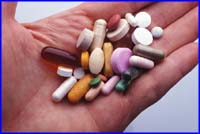
VITAMINS
Holly Alford, School of Chemistry, University of Bristol
E-mail: ha8477@bris.ac.uk

INTRODUCTION
Vitamins can be described as
"micronutrients" in that they are essential to humans but only in
small amounts. As they cannot be made in the body they must be obtained from food or
supplements and a lack of proper amounts of vitamins ie a non balanced diet can
lead to
a host of vitamin deficiency diseases. The human body requires different
amounts of vitamins and minerals according to age, sex, level of activity and
state of
health.
Vitamins have crucial functions in almost all bodily processes including the immune, hormonal and nervous system. Most vitamins are converted in vivo into coenzymes that work with metabolic enzymes to complete their biochemical functions.
There are 13 vitamins all together and these are divided into two main groups; the fat soluble vitamins A, D, E and K, and the water soluble vitamins B and C.
Water Soluble Vitamins
Vitamin C (ascorbic acid) and the B complex group; B1 (thiamine), B2 (riboflavin), B6 (pyridoxine) and B12 (niacin, pantothenic acid, biotin, folic acid and cobalamin) make up the nine water soluble vitamins. Water soluble vitamins cannot be stored in the body and therefore need to be consumed in some form everyday, this however means that there are no real side effects in an excess amount of water soluble vitamins in the body as they disperse in bodily fluids and are passed out in urine.
Fat Soluble Vitamins
Vitamins A, D, E and K are the fat soluble vitamins. Vitamins A, D and K are stored in the liver and vitamin E is distributed throughout the body's fatty tissues. Unlike the water soluble group, fat soluble vitamins are stored in the body and too much can lead to adverse side effects.
Vitamins and minerals are dependant on each other in the body to maintain certain functions, a bit like a recipe. For example, vitamin D, calcium, phosphorous, magnesium, zinc, fluoride, chloride, manganese, copper and sulphur are all needed in regulated amounts for healthy bones. Also, an excess in one vitamin or mineral can lead to a deficiency in another eg. an excessive amount of iron can lead to a deficiency in zinc and so one. This is one reason why a healthy and balanced diet is important.